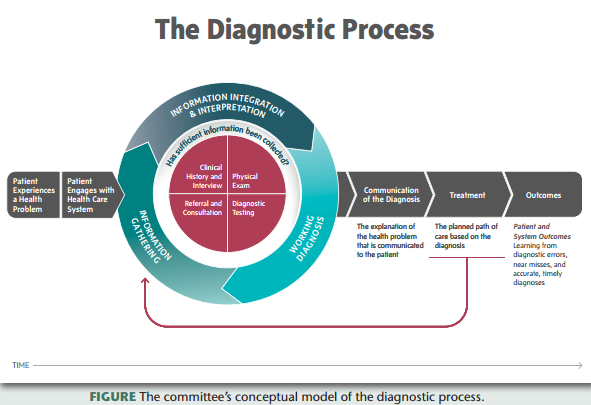The Institute of Medicine (IOM) is a nonprofit organization providing unbiased and authoritative research and advice to both decision makers and the public. Established in 1970, the IOM is the health arm of the National Academy of Sciences, chartered under President Lincoln in 1863. Through their research efforts the organization helps both the government and private sector make informed decisions on healthcare. You can follow their work on Twitter @theIOM, on Facebook and on Linkedin.
The IOM regularly publishes reports on topics ranging from public health issues, biomedical research, quality and patient safety, population and health disparities, and more. This week the Institute released Improving Diagnosis in Health Care. The report is a continuation of the organization’s landmark reports, To Err Is Human: Building A Safer Health System (2000) and Crossing the Quality Chasm: A New Health System for the 21st Century (2001).
In this new report, IOM found that diagnostic errors have been largely unappreciated. The report concludes that most people will experience at least one diagnostic error in their lifetime, saying urgent change is needed to improve the quality and safety of healthcare. The IOM researchers recommend a broad focus for reducing diagnostic errors, proposing a diagnostic process that identifies opportunities for improvement, as represented below:
The report also outlines eight specific goals to reduce diagnostic error:
- Facilitate more effective teamwork in the diagnostic process among health care professionals, patients, and their families.
- Enhance health care professional education and training in the diagnostic process.
- Ensure that health information technologies (IT) support patients and health care professionals in the diagnostic process.
- Develop and deploy approaches to identify, learn from, and reduce diagnostic errors and near misses in clinical practice.
- Establish a work system and culture that supports the diagnostic process and improvements in diagnostic performance.
- Develop a reporting environment and medical liability system that facilitates improved diagnosis through learning from diagnostic errors and near misses.
- Design a payment and care delivery environment that supports the diagnostic process.
- Provide dedicated funding for research on the diagnostic process and diagnostic errors.
The report concludes with the following:
“Without a dedicated focus on improving diagnosis, diagnostic errors will likely worsen as the delivery of health care and the diagnostic process continue to increase in complexity. Just as the diagnostic process is a collaborative activity, improving diagnosis will require collaboration and a widespread commitment to change among health care professionals, health care organizations, patients and their families, researchers, and policy makers. The committee’s recommendations contribute to the growing momentum for change in this crucial area of health care quality and safety.”

